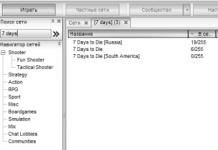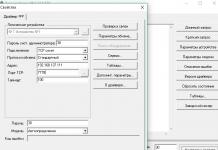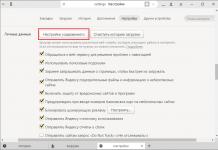Yandex.Kit is an alternative system for smartphones created by the search giant Yandex. This launcher is made specifically on the basis of the new mobile system and is fundamentally based on the official one, which was released specifically for devices on Android OS.
This application allows you to change the operating system interface of your Samsung Galaxy S5 smartphone and make it more convenient and visual. Now working with the phone will take place at a new level. The main screen will turn into a unified information environment - each of the desktops will contain separate programs and widgets, which will make it possible to quickly find out the latest news, weather, various news that may be useful to the user, view photos, and so on.






A separate feature of Yandex.Kit is the absence of an application menu as such, and in order to see them, you just need to flip the main screen to the side. Along with the main interface, the address book will also be replaced, which will become more convenient. Intelligent search allows you to quickly find contacts or, based on the desired request, find the nearest municipal and entertainment establishments and find out their contacts.






Contents: First launch of the device Yandex.Kit shell. Appearance, basic settings. Folders, shortcuts Widgets Dock bar Design themes Main screen panels Poster panel Time panel Notes panel Calendar panel Calculator panel News panel Weather panel Moon phase panel Photo panel Diler, branded features and settings Keyboard Yandex.Store Yandex.Disk Software version, Yandex assembly. Kit Productivity with Yandex.Kit firmware General…
The firmware from Yandex, called Yandex.Kit (Kit from the English Kit - set) was announced on February 19, 2014 at an official event. If before this there were only assumptions about what device users would ultimately receive, then at the event the Russian web giant took off the veil.
The history of the creation of Yandex.Kit began with the acquisition of SPB Software by Yandex (the transaction took place three years ago, on November 28, 2011). Previously known for its developments for most mobile platforms, SPB became the backbone of the team that worked on the creation of Yandex.Kit. And there is no need to dissemble here, Yandex.Kit is based on a product from SPB - SPB Shell 3D, a shell that has proven itself well on Windows Mobile. The remaining services belong entirely to Yandex, these are Yandex.Mail, Yandex.Maps, Yandex.Disk, Yandex.Taxi, and finally Yandex.Browser. All these services and applications are already integrated into the firmware by default. Thus, Yandex may be trying to take the first steps towards creating its own ecosystem as opposed to Google. And it should be added that services from Google are completely absent from Yandex.Kit; there is not a single element reminiscent of a competing company (Yandex is based on the freely distributed Android assembly with serial number 4.2.2). The application store, through which users could install programs, has been replaced here with its own - Yandex.Store (according to Yandex representatives, it now has more than 100,000 applications). Google Play Market can be installed if desired, but the most common applications are in the Store.
Today, only two devices are running Yandex.Kit, the first is the Huawei Honor 3 smartphone (it will be the hero of the review today), the second is the Explay Flame smartphone. The first smartphone has been on the market for quite some time and is selling successfully, the second will go on sale in the second half of April and will be sold with Yandex.Kit pre-installed (Huawei Honor 3 too). The release of devices with pre-installed Yandex.Kit is planned for the second half of April (while the material was being typed up, it became known that Huawei Honor 3 Yandex.Kit will go on sale from April 8! -comm.aut.), users do not yet have the opportunity to install it themselves. In the future, it is planned to release Yandex.Kit for tablets (Yandex's partner among manufacturers is still unknown, but we can assume that it will also be Huawei), of course, depending on how the devices are sold and how the market perceives them.

And today we will use the example of Huaewei Honor 3 to see what Yandex.Kit is. Let's look at its appearance, capabilities, settings, features, etc. Get ready for the Yandex.Kit review to be as detailed as possible, with a lot of screenshots and text. Otherwise, it would be impossible to fully cover all the elements of Yandex’s brainchild.
First launch of the device
At the first launch (from which you will immediately understand that you have a device with Yandex.Kit firmware in your hands), you will be asked to select the device language (Russian by default), select the time zone, indicate your existing account in Yandex services (or register if you don’t have one) ), indicate whether it is necessary to upload photos to Yandex.Disk, select the preferred applications that will be installed after the setup is completed (it is better to use a WiFi network for this), agree to the user agreement and that’s it. The phone will be ready to use in a few seconds.




Yandex.Kit shell. Appearance, basic settings.
The phone's desktop is nothing more than the familiar Yandex.Shell shell that you may have seen before (it is freely available on the Google Play Market or Yandex.Store). In Yandex.Kit, it has been redesigned in terms of design (it has become vector in most elements) and intuitive shell management. Most interface personalization items have been changed, controls have been added (although many have been removed, perhaps so as not to overload the standard interface for now).

Shell screens are panels with which you can do anything, remove or add elements, install widgets, place shortcuts. There are no obvious restrictions here, as in any other shell. The number of panels placed is not limited (the only thing I would like to remind you is that the more panels, the more RAM is used).


You can move between panels using standard swipes in both directions, or switch to the desired panel in the “carousel” mode; to do this, pinch the center of the screen with two fingers or click on the panel indicator strip below the main space. In carousel mode, each panel has its own animation, i.e. if this is a news panel, then in a couple of seconds a newspaper will unfold in front of you; if this is an application panel, then the main ones will be shown. Looks very nice.





The main concept of the Yandex.Kit shell is the abandonment of the standard application menu, where all the shortcuts to installed programs were usually located. Here, after installing the application, a program shortcut immediately appears on the panel (this is the approach to organizing the workspace of the MIUI shell and the like, and MIUI, in turn, borrowed the idea from iOS). The screen grid size is 5 rows and 4 columns. Those. You can place up to 20 elements on one panel at the same time (you cannot change the size of the grid, although in SBP Shell there were two types of grid: 4*4 and 5*5).
On the main screen of Yandex.Shell there is a weather widget with a search bar; it cannot be removed, it is tightly “glued”. In the search bar settings, you can specify which search service will be used - Yandex, Google or Bing. Below the widget there is space to place your elements.


Folders, shortcuts
The original feature of the Yandex.Kit shell is the way folders are placed on the screen; this can be either a classic view of the folder, when the shortcuts are inside it, or an expanded view, when the first three elements of the folder are always at hand, and the rest remain inside. On the panel you can add your own folders, give them names, place shortcuts, toggle switches, shortcuts, etc. in them. There is also a hidden folder in the settings in which you can remove elements that are used extremely rarely.




Widgets
Original widgets from Yandex are represented by 16 different widgets - Poster, Indicators, News, Weather, TV Program, Gallery, Birthdays, Magazine, Calendar, World Clock, Backlight, Messages, Moon Phases, Photo of the Day, Clock. Most of them are duplicate elements of the main panels that are located on the shell screens. And if you don’t want to install many panels, then you can place several Yandex widgets on one (two or three) screen at once. The toggle switches (indicators) widget turned out to be especially successful. On it you can configure the main switches - backlight, battery, Bluetooth, flashlight, GPS, mobile Internet, network status, profile, traffic jams, WiFi, access point. At the same time, you can place only five toggle switches on this widget, plus a status bar for the battery status or backlight level, or leave only the switches. Standard widgets from Yandex, alas, do not scale.





You can add classic widgets from Android to any of the screens (they are familiar to you, although some are part of the EmotionUI shell from Huawei) many of them are standard, the rest appear as you install third-party applications. They scale like in any other shell, all widget settings are in their usual places.

Dock bar
The standard quick launch bar, which is popularly referred to as the “dock bar,” contains up to five elements, and these can be both shortcuts and folders. The number of dock bars is not configurable, there is only one. Standard application icons from Yandex, when moved to the dock bar, are converted from raster to vector, third-party ones remain raster (in SPB Shell, third-party application icons simply became gray).


Themes
In the standard Yandex.Kit design setting there are only two themes - dark and light. If dark is set by default, then light can be switched in the system settings (Settings-Home Screen-Appearance) and it will be applied to all interface elements. Here you can also change the settings of the panels installed on the desktop in one menu (the settings of each panel are duplicated separately). Below we will provide several screenshots of the light theme.






Home Screen Panels
Panel poster
On this panel you can see what new films are showing in the theaters closest to you, read descriptions of films, and watch stills from them. If we go to the detailed description of the film, then below it will be indicated in which cinemas (including the address and distance to them) and what time the screenings will take place. Here you can also select the website of the rental company in your city for detailed information, call the box office to book tickets or visit the website afisha.yandex.ru (the information on it will correspond to what you saw on the panel). You can open the address of the cinema in Yandex.Maps if you don’t know where exactly the building is located.




At the top of the panel there is a drop-down list in which you can change the movie displayed on the main panel. There are no update frequency settings, you can only specify the use of paid connections (meaning cellular networks).
Time panel
In this panel you can select cities for which the current time will be displayed. It is not possible to display several cities at once (for example, as in the HTC Sense shell); you will have to view each one separately, changing the city in the drop-down list. The design of the watch can be changed; fortunately, there are more than sixty skins in the settings (from frankly masculine to glamorous feminine). Under the clock, information about the date and set alarms is duplicated. Even lower, it is indicated what lunar day it is today, the phase of the moon and the percentage of illumination of the Earth's satellite.





When you click on the clock, you can immediately go to selecting a skin, they are not installed locally, you will have to download each one separately. When you click on a date, it does not go to the calendar (although that would be logical), but starts setting an alarm. Clicking on the description of the lunar day will open a detailed calendar indicating the dates and phases of the moon at a certain moment.
Notes panel
Often, note widgets in shells are implemented by third-party applications; they have to be downloaded from the Google Play Market. In Yandex.Kit, the notes panel is present initially and is part of the shell. Notes are added by clicking the “+” button in the upper right corner of the panel, and each of them is given a color (random, last used, or manually specified). Notes can be divided into categories so that there is no jumble on one panel (when changing categories, notes from others are automatically removed). In addition to the main categories, you can create your own. Notes can be placed one above the other in the sequence in which you need. You can set three types of font on notes - small, regular or large.
A very useful feature if you need to make small notes without any special frills. What is missing, of course, is the insertion of images or a minimum set of special symbols (only those that are in the keyboard).
There is no online synchronization of notes with Yandex services; there is no analogy with Google Keep here. I would like to believe that this will be added in the future.




Calendar panel
The calendar panel displays the current month as a calendar, holidays for the coming days, and the next month. Clicking on a date in the calendar launches a standard application where you can set an event, schedule an appointment and set a reminder. In the panel options, you can configure which of the scheduled meetings to show, and specify which day of the week is the first (Monday or Sunday).




Panel calculator
The simplest calculator with which you can perform basic mathematical operations. There are no engineering functions here, only interest calculations. On the one hand, this is correct, if you overload the calculator with extra buttons it becomes difficult to use, but for students, calculating basic mathematical functions would be a good help. Perhaps they will appear in updates.

News panel
The news panel displays the latest events happening in the world and in the country, indicating the time the news was published in the media. You can specify several topics at once on which news will be updated and downloaded. News is divided into thematic channels; you cannot add your own from third-party sources. If you click on the news, it will open in a separate window, and just below there will be numerous information sources that mention the same news. By clicking on the source it will open in Yandex Browser.
It is impossible to display all the news in one feed at once (in a kind of mix); you will have to select a topic from the list in the news panel, and the latest news in the selected section will be automatically pulled up. In the settings you can specify which topics will be displayed, force news updates, clear cached data, automatic update time in hours (can be updated manually), and use of cellular networks.



Weather panel
Analogs of panels (or widgets) with weather display are found in most launchers from manufacturers, and this fate has not escaped Yandex.Kit. Here it (the panel) is made in a strict linear style (there is no pretentiousness of HTC Sense or the LG shell), and this probably makes it look even more advantageous. Again, there is no way to display the weather forecast in several cities at once (even in compressed form); the forecast for only one is constantly on the screen. The rest can be viewed if you change the city in the list line at the top of the panel. As soon as you change the city, a high-quality photo of significant places for this city is pulled from the Internet (for Moscow, of course, it was the Kremlin, for St. Isaac's Cathedral, for Blagoveshchensk, for some reason, an airplane flying over the border with China was displayed on the screen). By the way, Yandex has not forgotten about the authors of the photos taken; for each it is listed below the forecast (copyrights are strictly observed). By pulling the bottom border of the brief forecast, a detailed weather forecast for five days will be displayed on the entire screen.

In the panel settings, you can set additional cities, update frequency in hours, use of cellular networks when updating, temperature scale (Celsius or Fahrenheit), wind speed measurement (miles per hour, knots, meters per second, kilometers per hour), atmospheric scale pressure (inches, millimeters, hectopascals, atmospheres). Initially, the values that are characteristic of Russia were established - Celsius, meters and millimeters. The forecast can be forcibly updated by clicking on the update icon opposite the city in the panel (the same action can be performed from the settings menu). When viewing detailed settings, you can open the weather forecast in Yandex.Browser (though there is no particular point in this, everything is perfectly displayed on the panel itself). There is no weather forecast animation, although many analogues have it and have had it for a very long time.




Moon phase panel
This panel reflects the phases of the moon, as well as the astrological positions of the planets in the zodiac signs. Below you can see the sunrise and sunset times. The panel is clearly for those interested in astrology, amateur gardeners, or for girls to know when is the best time to get fashionable haircuts.
If you click on the Moon, the panel will change to a 3D image of a planetary circle, where you can see the location of the Sun and Earth in relation to the Moon. Here you can see which zodiac sign the Earth is in. At the time of writing this review, Earth was in Aries (whatever that sounds and whatever that means).

Photo panel
On the one hand, this is a good help when choosing wallpapers or images for entertainment or work, on the other hand, if you use downloading via cellular networks, this is another traffic eater.


Diler, branded chips and settings
Yandex.Kit is particularly proud of the redesigned interface of the standard Phone application. In essence, the standard system application was replaced with its own (albeit not completely), with a completely different concept and interface (although some “features” could be seen in the 2GIS Dialer application).








The dialer has added features that are unique to Yandex.Kit, such as: searching in the telephone directory by name, which can be either full or diminutive (for example, Alexander-Sasha-Shura, but if you search for “Sashka”, then the search will help and will not find anything), but only from the Russian language; “endless” phone book – if no match is found in the phone book, the dealer will turn to the Internet and display results corresponding to the request in the form of a list (this could be businesses, vacation spots, etc.); smart phone book that recognizes an unknown incoming call. But the last trick will only work if the phone is in the Yandex database itself, otherwise the numbers will remain numbers.








Contacts in the phone book can be entered either directly from the phone (saving is possible only in Yandex.Passport or on the phone’s SIM card), or by importing from a Google account (it’s better to do this when you first start the phone, in the future you won’t have to look for this option in settings), further updating of contacts occurs using the CardDAV protocol.



When adding or editing a contact, the card has all the necessary fields for identification. You can even indicate the degree of contact in relation to you - father, mother, friend, colleague, etc.
The main interface for making calls is inherited from the Huawei EmotionUI shell; Yandex.Kit has not yet had time to make changes. I would like to believe that this is a defect in the first version of the firmware.
Keyboard
Yandex considers another proprietary feature to be the keyboard application built into Yandex.Kit. The presentation announced smart predictive word input that is orders of magnitude better at guessing words than any other third-party keyboard. Whether this is true or not remains to be seen, but in the presentation Yandex used a slide where it was indicated that the keyboard was superior to many competitors when entering text.

It was not possible to find out whose developments were taken as a basis. The keyboard has only two themes – dark and light. And probably the main drawback is the lack of input using sliding gestures (swipe). We'll have to go back a couple of years and enter letters using the usual taps. There are only two input languages - Russian and English. There is no option to download additional languages or dictionaries, or to synchronize keyboard data with Yandex cloud services. It's simply not in the options. The Yandex engine is used for voice input.

The only feature that other keyboards cannot replicate yet is the so-called “Ranglish” input. Let's say the password that you set for this or that service was typed in Russian letters in the English layout. If you were using any other keyboard, you would have to peek into a regular desktop keyboard and type in your password. Yandex gracefully bypassed this point; when you press the language switch again, Russian letters appear on the keys of the English keyboard, and you calmly type your password. This only works in password entry fields; in other cases, the keyboard uses two traditional layouts.
Yandex.Store
The Yandex branded application store is pre-installed and the only place where you can download and install applications on your device. Let us repeat once again that the traditional Play Market from Google is not here and will not be. In Yandex.Store we managed to find all the most necessary applications; there are both paid and free versions. When purchasing applications through Yandex.Store, the user receives up to 10% of the purchase amount back. It's a small thing, but nice.




At the same time, Yandex did not block the installation of applications using APK packages from unknown sources. That is, if something is not found in Yandex.Store, you can always download the installation package from the Internet, copy it to your device and install it manually.
Yandex.Disk
When you log in to the cloud storage service from Yandex - Yandex.Disk, the company gives you 50GB of storage space. It is not yet known whether this generosity is temporary or whether the gigabytes will be assigned to your account forever. I would like to think that they will remain forever.
Software version, Yandex.Kit build
The OS version in the firmware with Yandex.Kit has not changed. Android version 4.2.2 is still used, but behind the general shell there is no noticeable absence of any features of the latest versions of flagship devices. Everything that is missing has been partially implemented by Yandex, everything that is missing can be additionally installed. Future updates depend entirely on the device manufacturer, i.e. As soon as the update appears, new firmware from Yandex will immediately appear. You must understand that Yandex itself cannot develop firmware from scratch; this requires completely different resources.

Performance with Yandex.Kit firmware
Testing the device in a synthetic test showed Antutu Benchmark X that the device began to work even a little faster (if such tests can be considered objective), judging by the scores received. In real life, there were no obvious brakes; everything started up, moved, and moved quickly. During the use of the device, not a single “crash”/FC application occurred (force close - forced termination of the application).



General impressions, conclusions
Using Huawei Honor 3 with Yandex.Kit firmware left mixed impressions. On the one hand, this firmware turned out to be very stable, but can it be considered a full-fledged firmware? I think, if you don’t go into details, then yes. If we dig deeper, we are offered to use a very young ecosystem from Yandex and, to tell the truth, be so-called “beta testers,” no matter how offensive it may sound. Especially considering that Yandex did not create software for devices from scratch, but put its own shell on it and provided it with the necessary services and applications.
In any of these cases, I want to believe that the Yandex company has a great desire to become the Russian Google, and it will not stop in case of some minor failures. This can be hindered by both low device sales and negative reviews from end users. And offering to buy a similar device for a second time (even with good technical characteristics) will require a lot of effort.
Minor flaws in terms of control ergonomics, design themes, and customization of Yandex.Kit - their correction is just a matter of time. Let's see how the market and buyers react to the first trial balloon, and later we will draw conclusions.
Huawei Honor 3 with Yandex.Kit firmware goes on official sale on April 8 at a price of 12,990 rubles. You can pre-order in the official online store shop.huawei.ru, THAT IS WHY address!
P.S. The editors of the Dpdroid.ru resource will be happy to answer all questions regarding Yandex.Kit, installations, settings, etc. You can leave your questions in the comments to the material!
Six months ago I was choosing a phone for myself and my choice fell on the budget model Flame Explay, which had the Yandex.Kit firmware. By all characteristics, the phone was excellent for its price of 5,000 rubles, and the young firmware from the domestic search engine called for supporting the manufacturer, in the hope that soon many applications would be adapted to Yandex.Store and everything would be fine.
But time passed and from time to time I was faced with the fact that I could not install some necessary application. Either I couldn’t get a free guide at the museum, or I couldn’t connect to the action camera - Yandex.Kit confidently refused me all applications without a million-strong audience, and at the beginning of May Yandex completely closed the Yandex.Kit project, so that something urgently needed to be done with my phone.
*Chinese programs for Android from Syma and HT quadcopters on the Flame Explay phone
It should be noted that I am currently busy developing a service for selecting quadcopters and I need to test online broadcasting from a phone, and for these purposes I need either a full-fledged Android or an iPhone. The Chinese, alas, do not write to other platforms. So there was only one way out - to reflash your phone, installing normal Android there.
In general, it turned out to be not so difficult if you know what software to use and where to get it. Before starting, I recommend formatting the flash drive in your phone so that there are no problems and, of course, saving all the data (phone numbers, photos, etc.), since everything will be deleted.
In total we need 4 files, you can immediately download them and put them in the root of your flash drive (which is in your phone):
1. The AOSP firmware itself (Android, as Google made it...)
2. Mobileuncle MTK Tools - to start flashing (directly on your phone)
3. Framaroot - to get root access (full access, that is)
4. Custom recovery (for example this)
If you do not have an account on the forum 4pda.ru/forum, then create one to download files.
We also need some kind of application for installing .apk files, I entered “APK” in the Yandex.Store search and found APK Installer (In the Yandex store it is called a little differently, but it has more than 1000 installations and there is no other similar one there , so don't get confused).
Next we proceed like this:
1. Using the APK Installer application, find the Framaroot program file in the root of the flash drive. The phone will curse, saying that it is not allowed to install third-party applications and will transfer it to where you need to check the box next to “Unknown sources”. After this, the program installs smoothly.
We do not install Mobileuncle MTK Tools yet, otherwise it will not get Root access
2. Go to Framaroot, leave “Install SuperSu” by default, select the last Barahir method and see: “Success :)... Root rights are installed. You must reboot your device."
Reboot the phone.
4. Using the APK Installer application, find the Mobileuncle MTK Tools program file in the root of the flash drive. We install.
5. Go to Mobileuncle MTK Tools. When you first log in, the phone should ask you for full access - we allow it.
6. We are looking for “Recovery Update”. Click.
7. At the beginning of the list, select the recovery that was downloaded to the root (if it can only be seen from the Internet, it means it was put in the wrong place)
8. Reboot in “Recovery” mode, the phone will ask where to find the ZIP firmware - we show it to it. And the installation has begun.
…
If you get an error like “I can’t open the file”:
1. Reboot
2. Go back to Mobileuncle MTK Tools
3. Select “Firmware update (Easy update from sdcard)”
4. Confirm the correctly found firmware file and launch it.
That’s it, in a few seconds you will see an unusual “Android” on your phone, but to make it as convenient to use as before, I recommend finding the Yandex.Shell application in Google Play and in a couple of seconds you will see the familiar interface:
So in the end we get the same phone, only on an updated platform and with full access to Google Play applications. It is worth noting that now I am really happy with my phone, a good large screen and sufficient performance are complemented by high-quality software and, it seems to me, it has become a really good offer for its little money, and in particular for using it as a monitor for online broadcasts from quadcopters.
Thank you for reading, I hope my experience will be useful to you and many thanks to the guys from the 4pda.ru forum who posted all the programs for free.
The entry was published by the author in the Uncategorized category. Add to bookmarks.Russian smartphone and tablet users can rejoice. Yandex has officially announced the release of a new Yandex Kit firmware based on Android. The firmware is specially made for Russian-speaking people, adapted to the requirements and specifics of the CIS countries and should become revolutionary.
Yandex Kit - an innovation among standard firmware
Cyanogenmod is an excellent firmware that is an alternative to the standard one. She has already found many fans and is actively joining the masses. Yandex also decided to keep up in this direction and is releasing its own version of the OS for mobile platforms, which is called Yandex.Kit.
One of the nice features is that it takes into account local and geo-dependent interests. The built-in keyboard perfectly understands cases and knows many slang words.
Kit has built-in data from Yandex.Directory, so finding the nearest contact information will not be a problem at all. This will also make it possible to determine the name of an incoming unknown call.
You can change your smartphone and transfer your entire contacts very easily through.
The slang innovation will be very visible when using the address book. For example, when the user enters Sash, Shura or Sasha, all matching options will be shown to him. In addition, data from the online directory will be loaded into the book.
The most common way to come up with or set a complex password is to enter it in Russian letters in the English layout. Kit will provide a unique feature for a special keyboard mode, in which both Russian and English letters will be displayed simultaneously.

Yandex Kit implements careful battery consumption, which minimizes the number of ongoing processes.
The interface will look like familiar desktops, only in 3D. The full list of applications has been completely removed, and all new ones are added to the main screen.


Unfortunately, Yandex Kit will only be available on Huawei Honor and Explay Flame smartphones for now, but that’s it for now. Also, users of this firmware will receive 10 discounts on purchases in the application store and 50 GB of cloud disk service.
The first models will be available in spring 2014.






A convenient and intuitive interface that makes working with an Android device easier and more enjoyable. It takes very little time to set up the screens. The interface can automatically distribute widgets and programs across screens. Useful and necessary widgets can be placed on one screen - one glance will be enough for you to be aware of current city events, weather and traffic conditions.
The Yandex.Shell address book contains phone numbers of organizations. Just enter a query—for example, “restaurant”—and the built-in search will show you the phone number and address of a nearby restaurant. If you receive a call from an unfamiliar number, Shell will check the availability of this number in the database. And if this number belongs to an organization, then you will see its name in the call log.
Improvements compared to Y.Shell:
T9 search appeared in the dialer. This is good. But! In such an implementation, it would not hurt to combine the dialer window with the Journal. And make the dialer keyboard collapsible and expandable.
The Log finally displays the SIM card from/to which the call was made (relevant for dual-SIM users)
You can create folders in the bottom bar
Deterioration:
App Drawer disappeared
Remains unchanged:
They never made a transparent status bar
The position of the Yandex team on this launcher:
1) this version of the shell is a “leaked” version of the whale beta, and is not supported outside the official versions of the whale and will not be supported.
2) we read bug reports and requests, but you shouldn’t expect us to have any reaction to them, because see point 1.


























